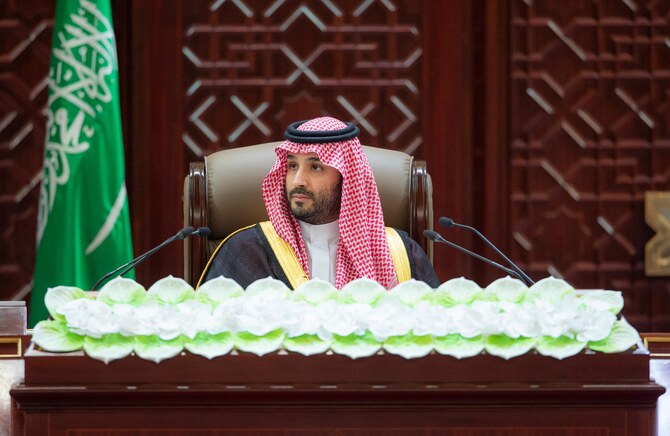RIYADH: Saudi Crown Prince Mohammed bin Salman said on Wednesday that the Kingdom would not recognize Israel without the establishment of a Palestinian state.
During an address to the Shoura Council, he also strongly condemned the “crimes of the Israeli occupation” against the Palestinian people.
“The Kingdom will not stop its tireless work toward the establishment of an independent Palestinian state with East Jerusalem as its capital, and we affirm that the Kingdom will not establish diplomatic relations with Israel without that,” the crown prince said.
Prince Mohammed thanked “countries that recognized the Palestinian state in embodiment of international legitimacy,” and urged other countries who had not done so to “take similar steps.”
The Kingdom sought to enhance regional and international security and peace by making efforts to reach political solutions to the crises in Yemen, Sudan, Libya and Ukraine, the crown prince said.
Turning to the Kingdom’s domestic situation, the crown prince said that any achievement made through Saudi Vision 2030’s comprehensive umbrella of various paths was an elevation for the nation, a benefit for the citizen, and immunity from fluctuations and changes for future generations.
“We are proceeding with optimism and confidence in continuing the journey to achieve our targets, according to a comprehensive and integrated approach based on careful review and prioritization,” the crown prince said.
“Our nation has made significant strides during this transformative period. Non-oil activities have reached a new pinnacle, contributing 50 percent of the real GDP last year. This achievement fosters sustainable and inclusive growth, solidifying our economic diversification efforts.
“The Public Investment Fund remains a driving force for investment, while unemployment rates have reached historic lows, declining from 12.8 percent in 2017 to 7.6 percent in the first quarter of 2024.”
The crown prince added that while the Kingdom moved forward “on the paths of modernization and diversity,” the country was keen to protect its identity and values, “which are an extension of the journey of our grandfathers and fathers.”


